- Home
- Stephen Hawking
My Brief History Page 2
My Brief History Read online
Page 2
English education in the 1950s was very hierarchical. Not only were schools divided into academic and non-academic, but the academic schools were further divided into A, B, and C streams. This worked well for those in the A stream but not so well for those in the B stream and badly for those in the C stream, who got discouraged. I was put in the A stream of St. Albans School, based on the results of the eleven-plus. But after the first year, everyone who ranked below twentieth in the class was assigned to the B stream. This was a tremendous blow to their self-confidence, from which some never recovered. In my first two terms at St. Albans, I came in twenty-fourth and twenty-third, respectively, but in my third term I came in eighteenth. So I just escaped being moved down at the end of the year.
WHEN I was thirteen, my father wanted me to try for Westminster School, one of Britain’s main public schools (what in the United States are called private schools). At that time, as I’ve mentioned, there was a sharp division in education along class lines, and my father felt that the social graces such a school would give me would be an advantage in life. My father believed that his own lack of poise and connections had led to him being passed over in his career in favor of people of less ability. He had a bit of a chip on his shoulder because he felt that other people who were not as good but who had the right background and connections had gotten ahead of him. He used to warn me against such people.
Because my parents were not well off, I would have to win a scholarship in order to attend Westminster. I was ill at the time of the scholarship examination, however, and did not take it. Instead, I remained at St. Albans School, where I got an education that was as good as, if not better than, the one I would have had at Westminster. I have never found that my lack of social graces has been a hindrance. But I think physics is a bit different from medicine. In physics it doesn’t matter what school you went to or to whom you are related. It matters what you do.
I was never more than about halfway up the class. (It was a very bright class.) My classwork was very untidy, and my handwriting was the despair of my teachers. But my classmates gave me the nickname Einstein, so presumably they saw signs of something better. When I was twelve, one of my friends bet another friend a bag of sweets that I would never amount to anything. I don’t know if this bet was ever settled, and if so, which way it was decided.
Me (at right), in my late teens (illustration credit 2.7)
I had six or seven close friends, most of whom I’m still in touch with. We used to have long discussions and arguments about everything from radio-controlled models to religion and from parapsychology to physics. One of the things we talked about was the origin of the universe and whether it had required a God to create it and set it going. I had heard that light from distant galaxies was shifted toward the red end of the spectrum and that this was supposed to indicate that the universe was expanding. (A shift toward the blue would have meant it was contracting.) But I was sure there must be some other reason for the red shift. An essentially unchanging and everlasting universe seemed so much more natural. Maybe light just got tired, and more red, on its way to us, I speculated. It was only after about two years of PhD research that I realized I had been wrong.
MY FATHER was engaged in research on tropical diseases, and he used to take me around his laboratory in Mill Hill. I enjoyed this, especially looking through microscopes. He also used to take me into the insect house, where he kept mosquitoes infected with tropical diseases. This worried me, because there always seemed to be a few mosquitoes flying around loose. He was very hardworking and dedicated to his research.
I was always very interested in how things operated, and I used to take them apart to see how they worked, but I was not so good at putting them back together again. My practical abilities never matched up to my theoretical inquiries. My father encouraged my interest in science, and he even coached me in mathematics until I got to a stage beyond his knowledge. With this background, and my father’s job, I took it as natural that I would go into scientific research.
My father on one of his field research trips to study tropical medicine (illustration credit 2.8)
When I came to the last two years of school, I wanted to specialize in mathematics and physics. There was an inspiring math teacher, Mr. Tahta, and the school had also just built a new math room, which the math set had as their classroom. But my father was very much against it, because he thought there wouldn’t be any jobs for mathematicians except as teachers. He would really have liked me to do medicine, but I showed no interest in biology, which seemed to me to be too descriptive and not sufficiently fundamental. It also had a rather low status at school. The brightest boys did mathematics and physics; the less bright did biology.
My father knew I wouldn’t do biology, but he made me do chemistry and only a small amount of mathematics. He felt this would keep my scientific options open. I’m now a professor of mathematics, but I have not had any formal instruction in mathematics since I left St. Albans School at the age of seventeen. I have had to pick up what I know as I went along. I used to supervise undergraduates at Cambridge and keep one week ahead of them in the course.
Me (at far left) at St. Albans School (illustration credit 2.9)
Physics was always the most boring subject at school because it was so easy and obvious. Chemistry was much more fun because unexpected things, such as explosions, kept happening. But physics and astronomy offered the hope of understanding where we came from and why we are here. I wanted to fathom the depths of the universe. Maybe I have succeeded to a small extent, but there’s still plenty I want to know.
3
OXFORD
MY FATHER WAS VERY KEEN THAT I SHOULD GO TO Oxford or Cambridge. He himself had gone to University College, Oxford, so he thought I should apply there, because I would have a greater chance of getting in. At that time, University College had no fellow in mathematics, which was another reason he wanted me to do chemistry: I could try for a scholarship in natural science rather than in mathematics.
The rest of the family went to India for a year, but I had to stay behind to do A-levels and university entrance exams. I stayed with the family of Dr. John Humphrey, a colleague of my father’s at the National Institute for Medical Research, at their house in Mill Hill. The house had a basement that contained steam engines and other models made by John Humphrey’s father, and I spent much of my time there. In the summer holidays I went to India to join the rest of the family, who were living in a house in Lucknow rented from a former chief minister of the Indian state of Uttar Pradesh who had been disgraced for corruption. My father refused to eat Indian food during his time there, so he hired an ex–British Indian Army cook and bearer to prepare and serve English food. I would have preferred something more exciting.
We went to Kashmir and rented a houseboat on the lake in Srinagar. We went in the monsoon, and the road that the Indian army had built over the mountains was washed away in some places (the normal route led across the ceasefire line to Pakistan). Our car, which we had brought from England, couldn’t cope with more than three inches of water, so we had to be towed by a Sikh truck driver.
MY HEADMASTER thought I was much too young to try for Oxford, but I went up in March 1959 to do the scholarship exam with two boys from the year above me at school. I was convinced I had done badly and was very depressed when, during the practical exam, university lecturers came around to talk to other students but not to me. Then, a few days after I got back from Oxford, I got a telegram to say I had received a scholarship.
Me coxing for the Boat Club (illustration credit 3.1)
I was seventeen, and most of the other students in my year had done military service and were a lot older. I felt rather lonely during my first year and part of the second. In my third year, in order to make more friends, I joined the Boat Club as a coxswain. My coxing career was fairly disastrous, though. Because the river at Oxford is too narrow to race side by side, they have bumping races in which the eights line up one behind anothe
r, with each cox holding a starting line to keep his boat the right distance behind the boat ahead.
The Boat Club at rest (illustration credit 3.2)
In my first race I let go of the starting line when the starting gun fired, but it caught in the rudder lines, with the result that our boat went off course and we were disqualified. Later I had a head-on collision with another eight, but at least in this case I can claim it was not my fault, as I had right of way over the other eight. Despite my lack of success as a cox, I did make more friends that year and was much happier.
The prevailing attitude at Oxford at that time was very anti-work. You were supposed to either be brilliant without effort or accept your limitations and get a fourth-class degree. To work hard to get a better class of degree was regarded as the mark of a “gray man,” the worst epithet in the Oxford vocabulary.
The Boat Club at play (illustration credit 3.3)
The colleges at that time regarded themselves as in loco parentis (in the place of parents), which meant they were responsible for the morals of the students. The colleges were therefore all single-sex and the gates were locked at midnight, by which time all visitors—especially those of the opposite sex—were supposed to be out. After that, if you wanted to leave, you had to climb a high wall topped with spikes. My college didn’t want its students getting injured, so it left a gap in the spikes, and it was quite easy to climb out. It was a different matter if you were found in bed with a member of the opposite sex, in which case you were sent down—expelled—on the spot.
The lowering of the age of majority to eighteen and the sexual revolution of the 1960s changed everything, but that was after I attended Oxford.
AT THAT time, the physics course was arranged in a way that made it particularly easy to avoid work. I did one exam before I went up, then had three years at Oxford with just the final exams at the end. I once calculated that I did about a thousand hours’ work in the three years I was there, an average of an hour a day. I’m not proud of this lack of work, but at the time I shared my attitude with most of my fellow students. We affected an air of complete boredom and the feeling that nothing was worth making an effort for. One result of my illness has been to change all that. When you are faced with the possibility of an early death, it makes you realize that life is worth living and that there are lots of things you want to do.
Because of my lack of preparation, I had planned to get through the final exam by doing problems in theoretical physics and avoiding questions that required factual knowledge. I didn’t sleep the night before the exam because of nervous tension, however, so I didn’t do very well. I was on the borderline between first- and second-class degrees, and I had to be interviewed by the examiners to determine which I should get. In the interview they asked me about my future plans. I replied that I wanted to do research. If they gave me a first, I told them, I would go to Cambridge. If I only got a second, I would stay in Oxford. They gave me a first.
As a backup plan, in case I wasn’t able to do research, I had applied to join the civil service. Because of my feelings about nuclear weapons, I didn’t want anything to do with defense. I therefore listed my preference as a job at the Ministry of Works (which at that time looked after public buildings) or one as a House of Commons clerk. In the interviews it became clear that I did not really know what a House of Commons clerk did, but despite this, I passed the interviews and all that remained was a written exam. Unfortunately, I completely forgot about it and missed the exam. The civil service selection board wrote me a nice letter saying I could try again the next year and they wouldn’t hold it against me. It was lucky I didn’t become a civil servant. I wouldn’t have managed with my disability.
Graduation from Oxford (above and below) (illustration credit 3.4)
(illustration credit 3.5)
IN THE long vacation following my final exam, the college offered a number of small travel grants. I thought my chances of getting one would be greater the farther I proposed to go. So I said I wanted to go to Iran. I set out with a fellow student, John Elder, who had been before and who knew the language, Farsi. We traveled by train to Istanbul, and then to Erzurum in eastern Turkey, near Mount Ararat. After that, the railway entered Soviet territory, so we had to take an Arab bus complete with chickens and sheep to Tabriz and then Tehran.
In Tehran, John and I parted company and I traveled south with another student to Isfahan, Shiraz, and Persepolis, which was the capital of the ancient Persian kings and was sacked by Alexander the Great. I then crossed the central desert to Mashhad.
On my way home, I and my traveling companion, Richard Chiin, were caught in the Bou’in-Zahra earthquake, a magnitude 7.1 quake that killed more than twelve thousand people. I must have been near the epicenter, but I was unaware of it because I was ill and in a bus that was bouncing around on the Iranian roads. Because we did not know the language, we did not learn of the disaster for several days, which we spent in Tabriz while I recovered from severe dysentery and a broken rib from being thrown against the front seat of the bus. It was not until we reached Istanbul that we learned what had happened.
I sent a postcard to my parents, who had been anxiously waiting for word for ten days. The last they had heard, I was leaving Tehran for the disaster region on the day of the quake.
4
CAMBRIDGE
I ARRIVED IN CAMBRIDGE AS A GRADUATE STUDENT IN October 1962. I had applied to work with Fred Hoyle, the most famous British astronomer of the time, and the principal defender of the steady-state theory. I say astronomer because cosmology was at that time hardly recognized as a legitimate field. That was where I wanted to do my research, inspired by having been on a summer course with Hoyle’s student Jayant Narlikar. However, Hoyle had enough students already, so to my great disappointment I was assigned to Dennis Sciama, of whom I had not heard.
It was probably for the best. Hoyle was away a lot, and I wouldn’t have had much of his attention. Sciama, on the other hand, was usually around and available to talk. I didn’t agree with many of his ideas, particularly on Mach’s principle, the idea that objects owe their inertia to the influence of all the other matter in the universe, but that stimulated me to develop my own picture.
When I began research, the two areas that seemed most exciting were cosmology and elementary particle physics. The latter was an active, rapidly changing field that attracted most of the best minds, while cosmology and general relativity were stuck where they had been in the 1930s. Richard Feynman, a Nobel Prize winner and one of the greatest physicists of the twentieth century, has given an amusing account of attending a conference on general relativity and gravitation in Warsaw in 1962. In a letter to his wife, he said, “I am not getting anything out of the meeting. I am learning nothing. Because there are no experiments, this field is not an active one, so few of the best men are doing work in it. The result is that there are hosts of dopes here (126) and it is not good for my blood pressure.… Remind me not to come to any more gravity conferences!”
OF COURSE, I wasn’t aware of all this when I began my research. But I felt that the study of elementary particles at that time was too like botany. Quantum electrodynamics—the theory of light and electrons that governs chemistry and the structure of atoms—had been worked out completely in the 1940s and 1950s. Attention had now shifted to the weak and strong nuclear forces between particles in the nucleus of an atom, but similar field theories didn’t seem to work to explain them. Indeed, the Cambridge school, in particular, held that there was no underlying field theory. Instead, everything would be determined by unitarity—that is, probability conservation—and certain characteristic patterns in the scattering of particles. With hindsight, it now seems amazing that it was thought this approach would work, but I remember the scorn that was poured on the first attempts at unified field theories of the weak nuclear forces, which ultimately took its place. The analytic S-matrix work is now forgotten, and I’m very glad I didn’t start my research in elementary particles.
None of my work from that period would have survived.
Cosmology and gravitation, on the other hand, were neglected fields that were ripe for development at that time. Unlike with elementary particles, there was a well-defined theory—the general theory of relativity—but this was thought to be impossibly difficult. People were so pleased to find any solution of the Einstein field equations that describe the theory that they didn’t ask what physical significance, if any, the solution had. This was the old school of general relativity that Feynman had encountered in Warsaw. Ironically, the Warsaw conference also marked the beginning of the renaissance of general relativity, though Feynman could be forgiven for not recognizing it at the time.
A new generation entered the field, and new centers of the study of general relativity appeared. Two of these were of particular importance to me. One was located in Hamburg, Germany, under Pascual Jordan. I never visited it, but I admired the elegant papers produced there, which were such a contrast to the previous messy work on general relativity. The other center was at King’s College, London, under Hermann Bondi.
Because I hadn’t done much mathematics at St. Albans or in the very easy physics course at Oxford, Sciama suggested I work on astrophysics. But having been cheated out of working with Hoyle, I wasn’t going to study something boring and earthbound such as Faraday rotation. I had come to Cambridge to do cosmology, and cosmology I was determined to do. So I read old textbooks on general relativity and traveled up to lectures at King’s College, London, each week, with three other students of Sciama’s. I followed the words and equations, but I didn’t really get a feel for the subject.

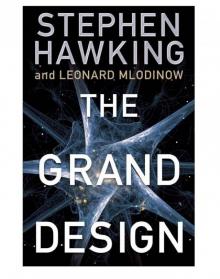 The Grand Design
The Grand Design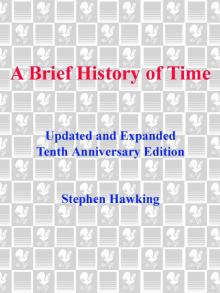 A Brief History of Time
A Brief History of Time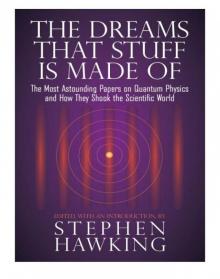 The Dreams That Stuff is Made of
The Dreams That Stuff is Made of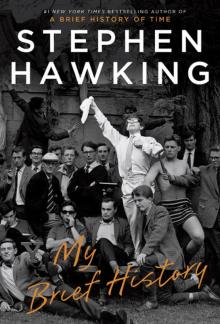 My Brief History
My Brief History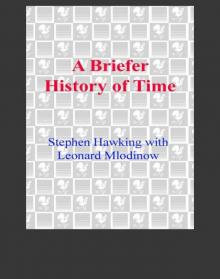 A Briefer History of Time
A Briefer History of Time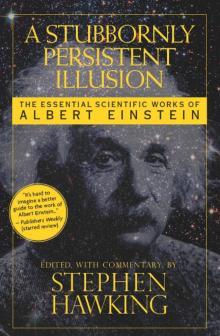 A Stubbornly Persistent Illusion
A Stubbornly Persistent Illusion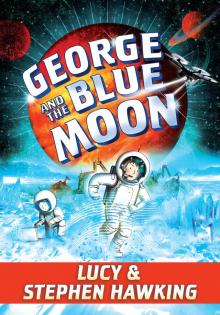 George and the Blue Moon
George and the Blue Moon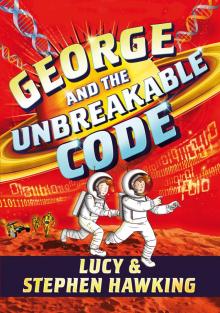 George and the Unbreakable Code
George and the Unbreakable Code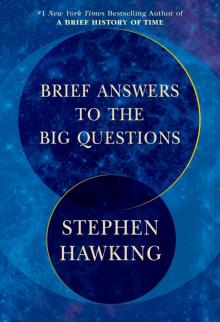 Brief Answers to the Big Questions
Brief Answers to the Big Questions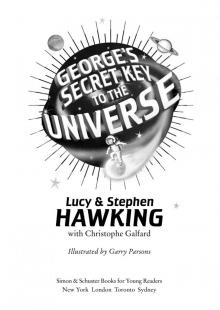 George's Secret Key to the Universe
George's Secret Key to the Universe